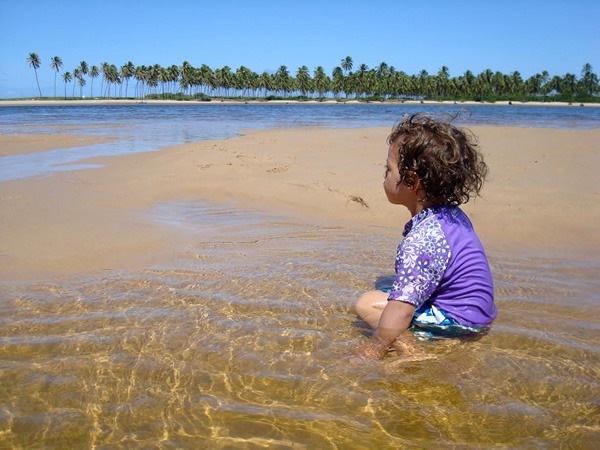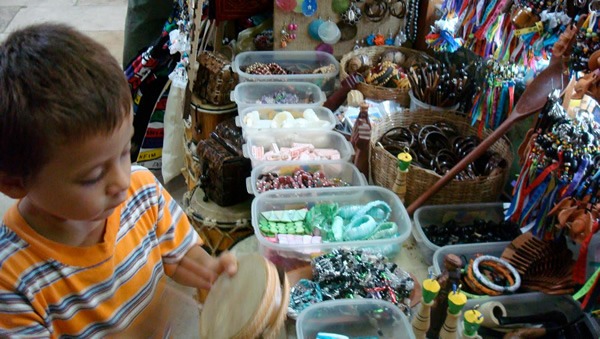Living Abroad as a Family in Bahia, Brazil
Coconut Milk and Capoeira
Article and photo by Eleanor Stanford
 |
| Our child enjoying the view from the Bahia Bay. |
I have a new name.
My sons have, on occasion, begun referring to me as Mamãe. My six-year old came into the house looking for me the other day. From upstairs, I heard him ask Dete, our nanny, Cadé Mamãe?
It was a strange, almost out-of-body experience. I looked around for a moment myself, wondering where this Mamãe person was.
Are we different people when we speak in different languages?
In some subtle ways, I think so, and I think my sons are beginning to understand this: that another language can be a mask, allowing them to express another aspect of themselves.
Why We Moved to Brazil
Giving our children this experience is one of the reasons why we moved to Brazil. Yes, my husband and I also wanted an adventure, wanted to live in a beautiful place and open ourselves to new experiences. But most of all, we wanted our kids to appreciate that the world is bigger — and smaller — than they could have imagined it to be in those narrow tree-lined blocks we left.
Six months ago, we were living in suburban Philadelphia, surrounded by strip malls and cul-de-sacs, Chemlawned yards strewn with toys, quiet streets where bored teenagers circle in cars on Saturday nights. My husband and I had been feeling restless, like we didn’t quite fit in.
We were expecting our third child, and somehow it began to feel like some higher power was issuing us an ultimatum: buy a minivan, or leave the country.
On a whim, my husband sent out resumés to several international schools, and we ended up here in Northeast Brazil, where he teaches math and physics, and I work as a guidance counselor.
Atmosphere in Salvador, Brazil
Salvador is the oldest city in Brazil, the most African-influenced in its culture. The food is rich with coconut milk and dendê (orange palm oil), sweet with tropical fruits: mango, papaya, pineapple, as well as those for which there are no words in English: pitanga, umbú, cajá. On the streets of the city, women in enormous white hoop skirts sell coconut sweets and acarajé (fried bean patties with okra and dried shrimp).
In the cobblestone squares of the historic district, men form a roda, the circle of participants in the martial art of capoeira. They spin and fall, lean back into a negativo, kick their legs up into an aú. One man plays the berimbau, a bent wooden rod held with a metal string.
North of the City
We live north of the city, along the coast, Here, on weekends, the beaches fill with people young and old — little kids building sandcastles, teenagers kissing on the rocks, old people sitting in tidal pools. Families settle in for hours under big yellow umbrellas, drinking beer and coconut water, ordering crabs and fried manioc from the stands that line the shore.
Each beach has a personality, and everyone has their favorite. We go to Azul Marinho for people watching. For calm surf and a beautiful, unspoiled stretch of sand, we drive up the coast forty-five minutes to Itacimirrim. When we want to go for a quick dip and a coconut, we head across the street from our house to Goa, where the wading is pleasant, but further out, the waves are rough, and the short-boarders swoop and swerve, disappearing into the breaks.
 |
|
Bahia bay in Brazil.
|
What Isolation?
One of my biggest fears in moving was isolation. However, we are fortunate enough to be part of a community of both locals and foreigners through the school where we work. As foreign hires, the school helps us negotiate paperwork, which in Brazil can be byzantine and infuriating. And while the salary is modest, the school paid for us to move here. They supply our housing, and offer free tuition for our children.
 |
| Market in Bahia. |
Safety and Children
We live in what’s called a condomínio fechado, a closed condominium. It is a common living arrangement for middle- to upper-middle class Brazilians. The walled community with a guard at the gate alleviates safety concerns — which are considerable in a growing, economically stratified Latin American city.
Within this square mile of humble rowhouses, between the soccer field and playground, the swimming pool and winding cobblestone drive, we live our lives. The boys roam freely, shirtless and barefoot. They run races with the other children down the driveway. They climb the mango trees or kick a soccer ball around.
Salvador is a vibrant and gritty urban area, beautiful, and unfortunately increasingly violent. The way we experience the city, though, is determined in large part by the fact that we have small children. We rarely venture into the center of town. We have yet to visit the art museum or go to a concert or bar.
Our life is circumscribed by our condominium, its walls edged with broken glass, and the international school where my husband and I work, and where our two older sons are students.
Brazilian Warmth
Yet, while having children here has in some ways limited my experience of Brazil, in other ways it has expanded and deepened it, giving us an entrée into the culture, and a deeper way of connecting with Brazilians.
I am continually impressed by how warmly children are received here. Unlike in the U.S., we’re never given dirty looks when they are noisy in a restaurant. Public breast-feeding is accepted, and often greeted with words of encouragement.
Brazilians are very affectionate with children — both their own and other people’s. I often notice in public people reaching out their hands to pat my sons’ heads in passing. Everyone in the condominium knows my sons. When I stroll with them, people I do not recognize greet them by name, ask after the baby’s teething or the three-year old’s progress on learning how to swim.
We employ a babá to care for the baby while we’re at work. I work part-time; when I arrive home at noon, with my preschool-age son, Dete stays to do the cooking and cleaning. I often find myself leaning against the doorframe of the kitchen, helping her remove the husks from peanuts that she’s roasted, or learning how to make traditional Bahian dishes like cuscús or fish moqueca.
We gossip about the neighbors, about the traffic on the Paralela, or the recent meningitis outbreak. She has a son who’s one month older than my baby, and we compare notes about nursing and teething and the never-ending struggle for sleep.
Having a nanny is something we would never have considered in the U.S. Not only is it beyond a teacher’s budget, but it is fraught in different ways there with class distinctions. Here in Brazil, it’s accepted that even middle class people have household help.
And while the economics of the situation are complicated, and make me uncomfortable in some ways, this does not change how much I cherish the relationship that both I and my sons have with Dete. She is probably the person closest to me here, outside of my own family.
It is through our ongoing conversation that I’ve become comfortable in Portuguese, that I can toss off phrases like “the baby spit up all over me,” or “Why won’t he nap on a schedule?”
Cut Off, Yet Connected
Sometimes I feel jealous when I hear about my colleagues at school talking about traveling hours to a beautiful beach accessible only by catamaran, attending a candomblé ceremony, or living in a neighborhood where they can walk to fashionable restaurants.
Living in a closed condominium has its advantages and disadvantages. But it is certainly one form of authentic Brazilian experience — as I am reminded when the neighbors congregate nightly under the algoroba tree to sip caipirinhas and watch their kids swing on the monkey bars, or set up a potluck of rice and beans and grill sausages on a Sunday afternoon.
When I see my sons trying out their capoeira on the grass with the neighbors’ children — kicking and spinning, clapping and dancing, plucking out a beat on the berimbau we bought at the market, joking with the other kids in Portuguese — I am grateful, even slightly awed, to be privileged enough to have this experience.
I think they will be, too.
For More Information About Bahia
Resources
For a historical and literary perspective, read the region’s most well known and well-loved writer, Jorge Amado (1912-2001). His magical realist novels deal largely with the poor black and mixed-race communities in Bahia. His best-known are Dona Flor and Her Two Husbands and Gabriela, Clove, and Cinnamon.
Bahia is the birthplace of some of the music for which Brazil is most famous. Check out Olodúm, the world-famous drum troop who were featured on Paul Simon’s Rhythm of the Saints album. They perform every year at Carnaval, and have also set up a music school for disadvantaged youth in Salvador.
Or, for a calmer mood, try Maria Bethânia singing “Tarde em Itapuã,” whose lyrics, by the Brazilian poet Vinicius de Morães, describe a delightful afternoon at the beach just north of Salvador (you can find version on Youtube.)
Food
Bahia is known to produce some of the most distinctive cuisine in Brazil. Many of the famous dishes can be bought on the street or at the beach. Acarajé, a black bean patty fried in dendê (orange palm oil), is served with a green tomato salad, okra, and a paste of cashew nuts called vatapá. Other dishes include moqueca (a fish stew); mucunzá (a corn and coconut milk pudding eaten for breakfast).
The beach is also a great place to try some traditional Bahian foods. A trip to the beach almost always involves sitting under an umbrella at a barraca (a shack that serves food and drinks). You can sip a coconut, beer, or caipininha (cachaça with lime juice and sugar) and nibble on boiled peanuts, fried manioc, or crabs.
Websites
Internations Salvador provides links to events where expats can get together.
International Schools Services contains a comprehensive listing international schools around the world by country; also has job listings for international schools. |
Eleanor Stanford’s first book, The Book of Sleep, was published in 2008. Her poems have appeared in Ploughshares, The Georgia Review, The Harvard Review, and other journals and anthologies. She lives with her family in Salvador, Brazil, where she works as a guidance counselor.
|
